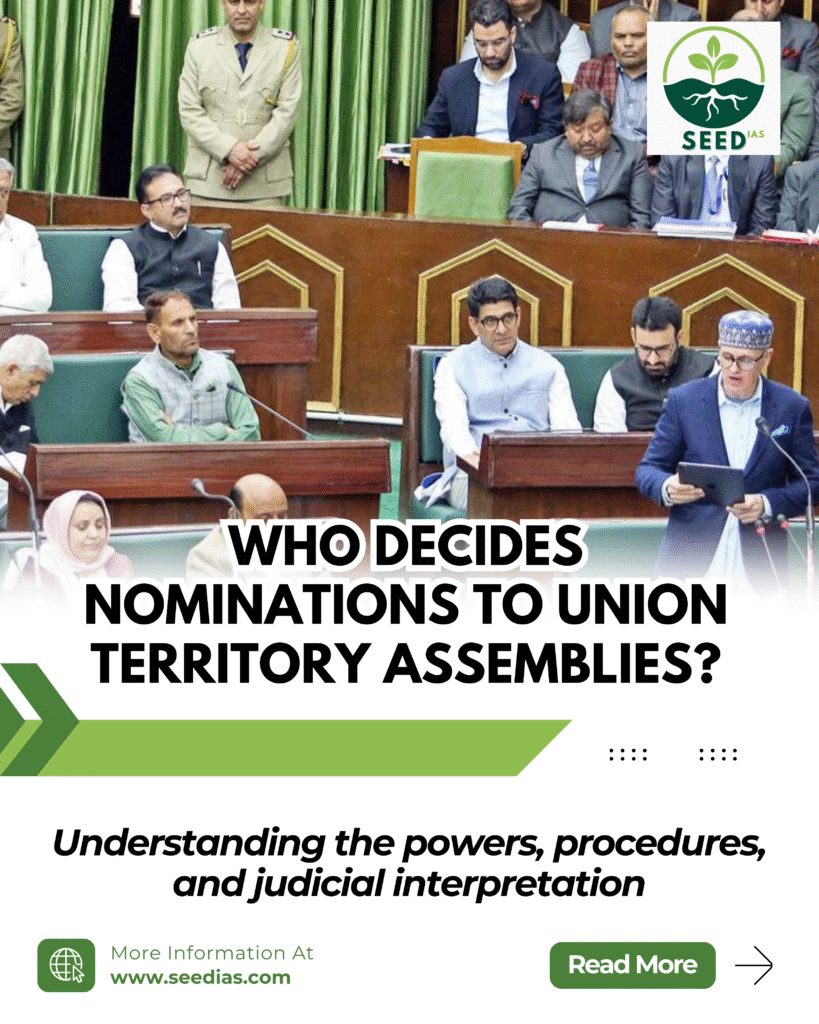Understanding the powers, procedures, and judicial interpretation
Why in News?
The Union Home Ministry informed the J&K and Ladakh High Court that the Lieutenant Governor (LG) of Jammu & Kashmir can nominate five members to the J&K Legislative Assembly without consulting the Council of Ministers. This has raised questions about democratic accountability and the role of the LG in UT legislatures.
Constitutional & Legal Basis
1. Nominated Members in Parliament & States
- Lok Sabha: Two Anglo-Indian members were nominated (discontinued in 2020).
- Rajya Sabha: 12 members are nominated by the President on the advice of the Union Council of Ministers.
- State Legislative Councils: Around 1/6th of members are nominated by the Governor on the advice of the State’s Council of Ministers.
2. Nominated Members in Union Territories (UTs)
- Delhi: 70 elected MLAs, no nominated members (Government of NCT of Delhi Act, 1991).
- Puducherry: 30 elected MLAs; up to 3 nominated members by the Union government (Government of Union Territories Act, 1963).
- Jammu & Kashmir: 90 elected MLAs; LG may nominate 5 members:
- 2 women
- 2 Kashmiri migrants
- 1 displaced person from Pakistan-occupied Kashmir
(J&K Reorganisation Act, 2019 as amended in 2023, Sections 15, 15A, 15B)
Judicial Interpretations
1. Puducherry Case (Madras HC, 2018)
- Court upheld the Union government’s power to nominate 3 MLAs without the advice of the UT Council of Ministers.
- Recommended a clear statutory procedure, later set aside by Supreme Court.
2. NCT of Delhi Case (Supreme Court, 2023)
- Introduced the concept of ‘triple chain of command’:
- Civil servants accountable to Ministers
- Ministers accountable to the Legislature
- Legislature accountable to the Electorate
- Court held the LG must follow aid and advice of Council of Ministers, except in matters where Delhi Assembly has no legislative powers.
- Although the case was about officer appointments, the principle may apply to MLA nominations as well.
Key Issues & Implications
- UTs are not full-fledged states but have elected governments accountable to the people.
- Nominated MLAs can affect majority formation in smaller assemblies like J&K and Puducherry.
- Political differences between Union and UT governments may disrupt democratic mandates.
- For J&K, LG-based nominations should ideally follow the advice of the Council of Ministers to respect democratic principles, especially since J&K was a State until 2019 and is expected to regain statehood.
Prelims Points
- Nominated MLAs in State Legislative Councils: ~1/6th of total members.
- Rajya Sabha: 12 nominated members by the President on Union Council advice.
- Constitutional provision for Anglo-Indian nominees discontinued in 2020.
Core Takeaways
- Nomination powers differ for Parliament, States, and UTs; UT nominations are governed by specific acts of Parliament.
- Judicial interpretations emphasise democratic accountability and the role of the Council of Ministers.
- Nominations have the potential to influence legislative majorities, especially in smaller assemblies.
- For J&K, respecting democratic norms while exercising LG powers is crucial.
Mains Question
“Discuss the role and powers of Lieutenant Governors in nominating members to Union Territory Legislative Assemblies. How do judicial pronouncements on the ‘triple chain of command’ and democratic accountability influence this process?”
Practice Prelims Question
Which of the following statements are correct?
- The LG of J&K can nominate 5 MLAs to the Assembly: 2 women, 2 Kashmiri migrants, 1 displaced person from Pakistan-occupied Kashmir.
- The Union government can nominate members to the Puducherry Assembly without the advice of its Council of Ministers.
- The Delhi Legislative Assembly allows the Union government to nominate up to 3 MLAs.
A) 1 and 2 only
B) 1 and 3 only
C) 2 and 3 only
D) 1, 2 and 3
Answer Key with Explanation (Prelims)
| Q. No. | Answer | Explanation |
| 1 | A) 1 and 2 only | Statement 1 is correct as per J&K Reorganisation Act, 2019. Statement 2 is correct as per Government of Union Territories Act, 1963. Statement 3 is incorrect: Delhi Assembly does not have nominated MLAs. |














